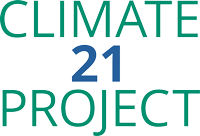Executive Office of the President

Climate change is unique among the issues facing the President, because both the effects and the policy solutions to the challenge defy neat categorization. Climate change is already or will soon affect every sector of the economy, every community in the nation, and every nation in the world. Reducing the greenhouse gas emissions that drive climate change and helping communities adapt to the unavoidable climate impacts already baked into the system requires domestic investment, rulemakings, and policy changes, as well as robust international diplomacy. That means that every agency has some degree of responsibility for addressing climate change—and so does every policy council in the White House.
This diffusion of responsibility for addressing climate change and furthering climate policy can all too easily lead to confusion and inaction. When everyone is partially responsible, no one is ultimately in charge. That is why the single most important thing a new White House committed to climate action must do is commission as Assistant to the President (AP) an experienced, respected Counselor or Senior Advisor who is 1) a credible leader on climate policy, 2) who sits in the West Wing and 3) who has direct access to and is trusted by the President of the United States, to lead the Administration’s domestic and international efforts on climate change.
Beyond appointing and empowering an AP for climate, there are other important White House organizational changes needed to create an integrated domestic and international vision for climate policy executed across the EOP and the federal government. The White House must have the staff capacity and credibility to manage a whole-of-government effort; policy councils must be bought into the structure of the White House climate effort and actively collaborate on climate policy where needed; and non-policy offices must have dedicated support for the climate effort. Senior White House staff should also regularly engage with senior agency leadership to develop an ambitious climate agenda, monitor implementation, and identify opportunities to increase ambition.
Lead Authors


